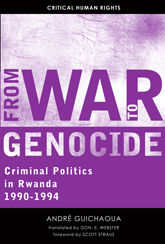|
From War to Genocide
Criminal Politics in Rwanda, 1990–1994
André Guichaoua, Translated by Don E. Webster, Foreword by Scott Straus
Critical Human Rights
Steve J. Stern and Scott Straus, Series Editors
“A landmark in the historiography of the Rwandan genocide. No serious
scholar writing about the genocide can afford to ignore this trailblazing
contribution.”
—René Lemarchand, author of The Dynamics of Violence in Central Africa
In April 1994 Rwanda exploded in violence, with political, social, and economic
divisions most visible along ethnic lines of the Hutu and Tutsi factions. The ensuing
killings resulted in the deaths of as much as 20 percent of Rwanda’s population.
André Guichaoua, who was present as the genocide began, unfolds a complex story
with multiple actors, including three major political parties that each encompassed
a spectrum of positions, all reacting to and influencing a rapidly evolving situation.
Economic polarities, famine-fueled privation, clientelism, corruption, north-south
rivalries, and events in the neighboring nations of Burundi and Uganda all deepened
ethnic tensions, allowing extremists to prevail over moderates.
Guichaoua draws on years of meticulous research to describe and analyze
this history. He emphasizes that the same virulent controversies that fueled the
conflict have often influenced judicial, political, and diplomatic responses to it,
reproducing the partisan cleavages between the former belligerents and implicating
state actors, international institutions, academics, and the media. Guichaoua
insists upon the imperative of absolute intellectual independence in pursuing the
truth about some of the gravest human rights violations of the twentieth century.
 André Guichaoua is a professor of sociology, specializing in the African Great Lakes region, at the University of Paris 1 Pantheon-Sorbonne. He served as an expert witness on the Rwandan genocide before several courts and judicial bodies, including the International Criminal Tribunal for Rwanda of the United Nations.
André Guichaoua is a professor of sociology, specializing in the African Great Lakes region, at the University of Paris 1 Pantheon-Sorbonne. He served as an expert witness on the Rwandan genocide before several courts and judicial bodies, including the International Criminal Tribunal for Rwanda of the United Nations.
Don E. Webster is a former senior legal counsel and prosecutor for the United Nations International Criminal Tribunal for Rwanda.
Additional Resources
For extensive supplementary information, visit these websites:
http://rwandadelaguerreaugenocide.univ-paris1.fr/
http://genevaconference-tpir.univ
-paris1.fr/
Praise
“Seminal. . . . A meticulously detailed account that challenges both the Tutsi-controlled Rwandan government’s official narrative about the causes, events and consequences of the genocide as well as elements of the international community’s consensus narrative and the denialist accounts of Hutu extremists who still seek to enact their hateful ideology from abroad.”
—Washington Post
“Dispels myth after myth about the Rwandan genocide and Rwandan history.”
—Washington Post
“Magisterial. . . . Makes a compelling case that the scaling up of violence to genocidal levels was progressive and tied at least in part to the escalation of the civil war and the timid and ineffectual international response to the initial violence.”
—Foreign Affairs
Publicity and Press Kit Resources
Click here for current & upcoming UW Press events
Download high resolution cover, color
Download high resolution cover, b/w
Download high resolution author photo, André Guichaoua, color
Download high resolution author photo, André Guichaoua, b/w
All images are at least 2.25 inches at 300 dpi wide; current title covers are a minimum of 1500 px wide/6 inches wide at 300 dpi. Please contact us if you need a custom size.
Media & bookseller inquiries regarding review copies, events, and interviews can be directed to the publicity department at publicity@uwpress.wisc.edu or (608) 263-0734. (If you want to examine a book for possible course use, please see our Course Books page. If you want to examine a book for possible rights licensing, please see Rights & Permissions.)
Of Related Interest
|

Remaking Rwanda
State Building and Human Rights after Mass Violence
Edited by Scott Straus and Lars Waldorf |
|

Larger images
New in Paperback!
June 2017
LC: 2015010239 DT
478 pp. 6 x 9
4 maps, 2 tables
• Original French edition: Éditions La Découverte, 2010
|

